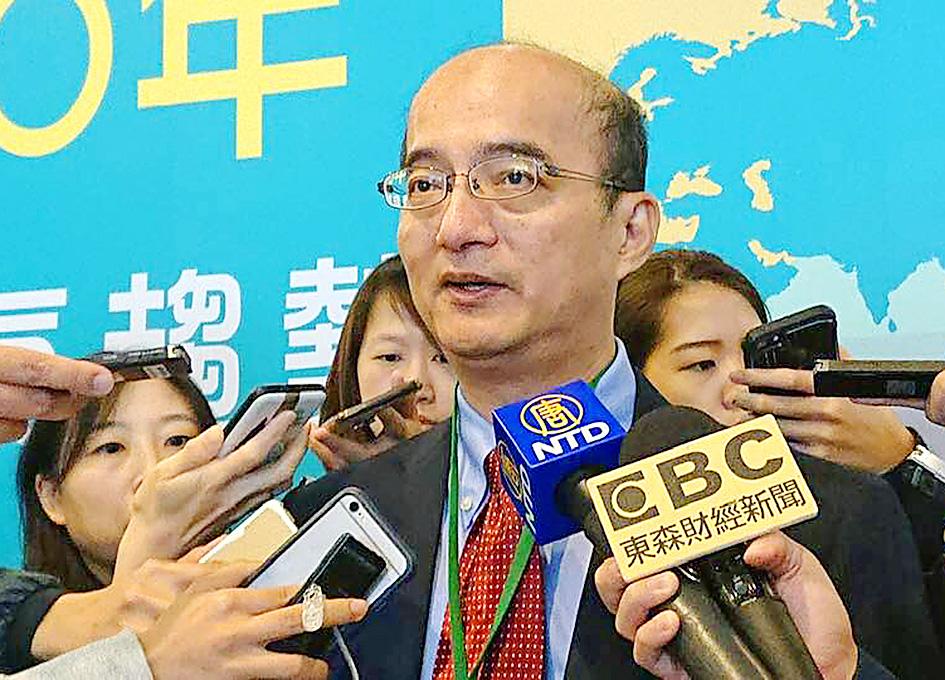Taiwan has become a leader in the global supply chain, as an increasing number of its overseas companies have been investing more funds at home, economists said on Saturday.
Taiwan Institute of Economic Research (TIER, 台灣經濟研究院) president Chang Chien-yi (張建一) said that the government’s incentive programs for Taiwanese investors, launched last year, have attracted many top-tier Taiwanese manufacturers to return.
In their wake, second and third-tier industries have also returned, helping the nation reshape its production structure, Chang said.

Photo: CNA
“The move by these Taiwanese investors to come home has helped Taiwan assume the position of commander, or the brain, of the global supply chain,” he said. “This development is expected to boost Taiwan’s status in global trade.”
The incentive programs were launched as companies were seeking to move some of their production out of China to avoid the US’ increased tariffs on Chinese-made products during a trade dispute.
As of Friday, 473 Taiwanese companies have pledged to invest a combined NT$989.1 billion (US$33.1 billion) in the home market under the incentive programs, while 56 more are waiting for approval, the Ministry of Economic Affairs said.
Even Taiwanese companies that operate businesses in China and Southeast Asian countries have been able to use Taiwan as a hub while mapping out global expansion strategies to meet the needs of various clients, Chang said.
Earlier last week, Minister Without Portfolio Kung Ming-hsin (龔明鑫) said that NT$200 billion of the nearly NT$1 trillion in pledged returning funds had been invested last year.
Companies this year are expected to invest an additional NT$325.3 billion, which amounts to 1.7 percent of the nation’s NT$19 trillion GDP and boosting the economy, Kung said.
Taiwan’s GDP grew 1.54 percent in the first quarter of the year, outperforming many nations as the global economy was being affected by the COVID-19 pandemic, the Directorate-General of Budget, Accounting and Statistics said.
Pledged investments are expected to reach about NT$500 billion this year, which would improve Taiwan’s status in the global supply chain, the ministry said.
Listed manufacturers’ combined sales last year fell 2.8 percent from a year earlier to NT$16.5 trillion amid the US-China trade dispute, the ministry said.
Their total net income fell 19.8 percent annually to NT$1.23 trillion, it said.
However, manufacturers’ spending on research and development (R&D) last year rose 7.9 percent to a five-year high of NT$460.8 billion, with the electronic components industry spending the most at NT$266.3 billion, followed by the computer and optoelectronics industry at NT$123.8 billion, according to ministry data.
The two industries accounted for 84.7 percent of total R&D spending in Taiwan’s manufacturing sector last year, the ministry said.

MULTIFACETED: A task force has analyzed possible scenarios and created responses to assist domestic industries in dealing with US tariffs, the economics minister said The Executive Yuan is tomorrow to announce countermeasures to US President Donald Trump’s planned reciprocal tariffs, although the details of the plan would not be made public until Monday next week, Minister of Economic Affairs J.W. Kuo (郭智輝) said yesterday. The Cabinet established an economic and trade task force in November last year to deal with US trade and tariff related issues, Kuo told reporters outside the legislature in Taipei. The task force has been analyzing and evaluating all kinds of scenarios to identify suitable responses and determine how best to assist domestic industries in managing the effects of Trump’s tariffs, he

TIGHT-LIPPED: UMC said it had no merger plans at the moment, after Nikkei Asia reported that the firm and GlobalFoundries were considering restarting merger talks United Microelectronics Corp (UMC, 聯電), the world’s No. 4 contract chipmaker, yesterday launched a new US$5 billion 12-inch chip factory in Singapore as part of its latest effort to diversify its manufacturing footprint amid growing geopolitical risks. The new factory, adjacent to UMC’s existing Singapore fab in the Pasir Res Wafer Fab Park, is scheduled to enter volume production next year, utilizing mature 22-nanometer and 28-nanometer process technologies, UMC said in a statement. The company plans to invest US$5 billion during the first phase of the new fab, which would have an installed capacity of 30,000 12-inch wafers per month, it said. The

Taiwan’s official purchasing managers’ index (PMI) last month rose 0.2 percentage points to 54.2, in a second consecutive month of expansion, thanks to front-loading demand intended to avoid potential US tariff hikes, the Chung-Hua Institution for Economic Research (CIER, 中華經濟研究院) said yesterday. While short-term demand appeared robust, uncertainties rose due to US President Donald Trump’s unpredictable trade policy, CIER president Lien Hsien-ming (連賢明) told a news conference in Taipei. Taiwan’s economy this year would be characterized by high-level fluctuations and the volatility would be wilder than most expect, Lien said Demand for electronics, particularly semiconductors, continues to benefit from US technology giants’ effort

‘SWASTICAR’: Tesla CEO Elon Musk’s close association with Donald Trump has prompted opponents to brand him a ‘Nazi’ and resulted in a dramatic drop in sales Demonstrators descended on Tesla Inc dealerships across the US, and in Europe and Canada on Saturday to protest company chief Elon Musk, who has amassed extraordinary power as a top adviser to US President Donald Trump. Waving signs with messages such as “Musk is stealing our money” and “Reclaim our country,” the protests largely took place peacefully following fiery episodes of vandalism on Tesla vehicles, dealerships and other facilities in recent weeks that US officials have denounced as terrorism. Hundreds rallied on Saturday outside the Tesla dealership in Manhattan. Some blasted Musk, the world’s richest man, while others demanded the shuttering of his